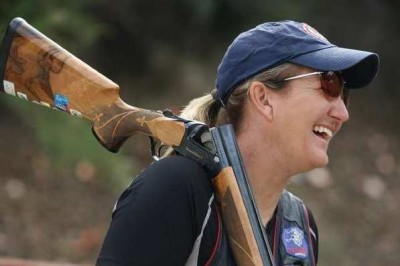
Olympic shooter Kim Rhode. (Photo: LA Times)
The Summer Olympics are in Rio this year, and the United States is looking to repeat its 2012 total gold medal victory over China and Russia. American shooters earned three of those medals—tied with gymnasts for the third most golds behind swimming and track and field. But as the Wall Street Journal reported last week, you’re not likely to hear about Kim Rhode or Vincent Hancock on any Summer Olympic previews.
According to the Journal, last year’s gold medal count has held true for the entire history of the Olympic Games: American shooters have won more golds for the United States than every other type of Summer Olympic athlete except swimmers and track and field participants. But the public perception of guns as dangerous and frightening has kept the media and most corporate sponsors from recognizing the achievements of Team USA shooters.
Kim Rhode, for instance, has won an Olympic medal at each of the five preceding Summer Games. Rhode participates in trap and skeet competitions and since the 1996 Games in Atlanta the 36-year-old from southern California has earned three gold medals, one silver, and one bronze. If she wins another this year, she’ll become the first American ever to win a medal at six different Olympics. Michael Phelps? He’s earned medals at only three.
But most Americans have never heard of Rhode. As she told the Journal, “Our sport has an unfortunate stigma attached to it.” Before the London Games, which started days after a shooting at a movie theater in Colorado, she received death threats and had to be assigned additional security.
Robert Mitchell, executive director of USA Shooting, was once asked by a woman seated behind him on a flight, “So you teach people how to hold up 7-Elevens?” He took the time to explain the skill and dedication of American shooters, and, he recalls, she left the conversation with a newfound appreciation for the sport.
The media sought out comment from Rhode after the San Bernardino shooting, to which she responded with “sorrow for the victims and support for gun rights” but also a question: Why should that crime have placed her in the spotlight? “You don’t hear them asking Nascar drivers to comment on crimes involving cars.”
Among all the successful Olympic shooters, only one has been inducted into the U.S. Olympic Hall of Fame. Lones Wigger won a gold medal in 1964 for the three-position small-bore rifle competition at 50 meters and a gold in 1972 for the three-position free rifle competition at 300 meters.
He deserves the acclaim he received, but he was less than enthusiastic in his interview with the Journal. He called his Hall of Fame nod “a token thing.”
“We have several other people who ought to be in consideration. But guns are political,” he concluded.
Political is right. Some competitors—like Nathalia Granados who lives with her husband in New York—isn’t permitted to own the pistol she needs for the 25-meter event. Others have had difficulty transporting their firearms to competitions.
Shooting sports are an integral part of life for thousands of Americans. But as the Journal notes, “Many [Americans] are blind to the discipline and skill required, as well as the joy that elite marksmanship can stir.” Our shooters succeed at every international competition they enter, and they deserve more credit and attention than they’ve been given thus far.